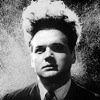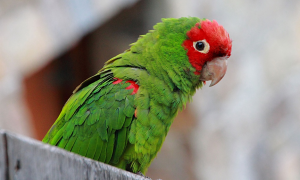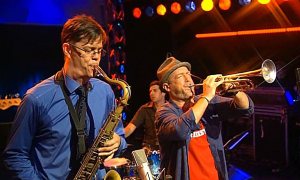Home » Jazz Articles » Genius Guide to Jazz » Giving You the Bird
Giving You the Bird
The result evoked what the floor show would have been like in a decadent, gaslit Weimar-era Berlin nightspot if Bertolt Brecht and Joe Venuti had been doing shots of absinthe with Wallace Stevens and e.e. cummings at Salvador Dali

Chicago has made some very, very important contributions to society. The City of Big Shoulders has given us deep dish pizza, economy-sized gangland slayings, the Sears catalog, a baseball club for masochists, and those nifty Italian steak sandwiches that are dipped completely in the beef juices before serving and why these things aren’t a staple here in the grease-happy South is beyond me.
Chicago also gave us several vital contributions to American music. It acted as an early incubator for jazz, when King Oliver came up from New Orleans and soon unleashed a young Louis Armstrong on the world. It was the birthplace of electric blues, as Delta musicians arrived with their country blues tradition and found that acoustic guitars could not be heard over those damned elevated trains. It gave us the band Chicago, who were recently found not guilty of causing Peter Cetera’s solo career in the U.S. District Court for the Northern District of Illinois. It also gave us The Blues Brothers, which brought such uniquely American styles as blues, rhythm-and-blues, and soul music to a new audience.

(On a side note, The Blues Brothers was recently exonerated of most culpability in all resultant films. The Supreme Court found in the case of U.S. vs. Aykroyd [1999], that director John Landis and the estate of John Belushi could not be held responsible for Caddyshack II, Dr. Detroit, My Stepmother is an Alien, Ghostbusters II or Nothing But Trouble. Landis was found partially responsible for Blues Brothers 2000, and ordered to pay damages in the amount of $156.75 to all 24 people who saw it.)
But what has Chicago done for us lately? It has been almost two decades since the Bears were any fun to watch. The Bulls have returned to their pre-Jordan levels of sucking. I recently saw the Blackhawks team portrait on the side of a milk carton. The White Sox haven’t done anything interesting since 1919 (and let’s not get me started on that ). As for the Cubs, God bless ‘em, they’re still the Cubs. Of course, you could make a case for Oprah Winfrey, but when was the last time she won a major sporting event?
Then, there’s Andrew Bird. Chi-town’s eclectic singer-songwriter-violinist first came to our attention during the 20 minute-long swing revival of the mid-nineties, playing with the late and lamented Squirrel Nut Zippers. He came into his own with 1998’s Thrills, unleashing the precocious then-25 year old Bird’s intriguing blend of jazz, Gypsy, German cabaret, and several other types of music that begin with a “J” sound. The result evoked what the floor show would have been like in a decadent, gaslit Weimar-era Berlin nightspot if Bertolt Brecht and Joe Venuti had been doing shots of absinthe with Wallace Stevens and e.e. cummings at Salvador Dali’s table. And the research that went into that sentence alone ought to be worth a master’s degree in some damned thing or another.
Be that as it may.
The promise shown in Thrills came into full blossom with 1999’s Oh! The Grandeur. A personal favorite of mine, Grandeur made the most of both Bird’s smooth, confident vocals and evolving instrumental prowess. It also contains one of the most useful garment-removal tunes since Johnny Hartman roamed the earth, the efficiently seductive “Wait.” In fact, that song has been shown in scientific experiments conducted at Virginia Tech to be a proven aid in disrobing a compliant, completely sober adult female. Members of a control group listened to Leo Sayers’ “You Make Me Feel Like Dancing,” and had actually put on more clothes by the end of the song.
 At the same time as Bird was making his solo reputation, he was also lending his talents to another group composed of many of the same personnel from his own backing band, Bowl of Fire. Percussionist Kevin O’Donnell’s Quality Six mined much of the same territory as Bird’s first two solo albums, but with a decidedly more jazz-tinged sound. Heretic Blues and Control Freak are must-have CD’s for any serious Bird collector, even if you’re a Larry Bird collector. The clever, buoyant music will help keep your mind off the fact that the Celtics probably won’t win another NBA championship until the Red Sox win another World Series, which is about as likely as Madonna being given an Academy Award for Best Actress while winning the lottery on Friday the 13th.
At the same time as Bird was making his solo reputation, he was also lending his talents to another group composed of many of the same personnel from his own backing band, Bowl of Fire. Percussionist Kevin O’Donnell’s Quality Six mined much of the same territory as Bird’s first two solo albums, but with a decidedly more jazz-tinged sound. Heretic Blues and Control Freak are must-have CD’s for any serious Bird collector, even if you’re a Larry Bird collector. The clever, buoyant music will help keep your mind off the fact that the Celtics probably won’t win another NBA championship until the Red Sox win another World Series, which is about as likely as Madonna being given an Academy Award for Best Actress while winning the lottery on Friday the 13th.
The new millennium brought somewhat of a departure for Bird, 2001’s underrated The Swimming Hour. Straying from the magic-lantern nostalgia of his first two albums, Bird seemed to move towards a more retro-flavored rock sound (possibly explained by the fact that his tour at the time was being sponsored by Retro Flavored Doritos®). The shock of the new certainly affected seasoned Bird fans and may have contributed to Bird’s decision to leave his label, Rykodisc, with his songs in a hobo sack tied to the end of his violin bow.
Bird’s next album, the recent Weather Systems, was at first self-released. It soon came to the attention of Indie Queen Ani DiFranco who, besides being the hereditary monarch of the sprawling archipelago (or am I thinking of Micronesia?), has also amassed a considerable fortune from the sale of her DiFranco-American Spaghettios. Using her wealth and influence to start Righteous Babe Records, she signed Bird to the new label and re-released Weather Systems in June of this year. The first single, “Lull,” has already begun attracting a measure of radio airplay. Weather Systems demonstrates the continuing maturation of Bird’s music as it evolves into a pleasant amalgam of the exotic influences of his first two CD’s and the more modern experimentalism of The Swimming Hour.
While it appears that his recording career is on solid ground, Bird still prefers the immediacy of live performing to the tedium of the recording process. His approach to improvisation has more in common with Louis Armstrong’s orthodoxy of melodic invention (also later championed by Miles Davis) than the showy acrobatics of the Bop masters, even though the more tenable connections to jazz in his playing have diminished since his first arrival.
Still, kids, your Own Personal Genius is of the opinion that Bird’s music is best appreciated by the willing ear of the jazz listener. Too smart for pop, not angry enough for alternative, not quite enough navel-gazing for folk, and nowhere near the requisite amount of pickup truck references for country. It is to jazz like a distant friend I think Andrew Bird can best be received. How else can you explain this column, which doesn’t contain a single poultry gag despite being given ample opportunity and didn’t make a single reference to my own beloved parakeet until just now?
 I should mention, before we finish up for the month, that I had the opportunity to speak to Andrew Bird recently and found him both reflective and pleasant. He reminded me a lot of myself, if I were relatively sane and played the violin, in that his twenties were been a time of discovery and of finding his creative voice. Now heading into his thirties (via the bypass, to avoid the drivetime traffic of the last of the Gen Xers), it’s time for him to hone his artistic self. In short, the best is yet to come. Let’s hope the same is true of me, because I’d hate to think that the Spaghettios gag is the apex of my creative abilities.
I should mention, before we finish up for the month, that I had the opportunity to speak to Andrew Bird recently and found him both reflective and pleasant. He reminded me a lot of myself, if I were relatively sane and played the violin, in that his twenties were been a time of discovery and of finding his creative voice. Now heading into his thirties (via the bypass, to avoid the drivetime traffic of the last of the Gen Xers), it’s time for him to hone his artistic self. In short, the best is yet to come. Let’s hope the same is true of me, because I’d hate to think that the Spaghettios gag is the apex of my creative abilities.
Bird will be out performing live this month. Check out Bird's website for dates and venue information. Get out and see him if you can, and be sure to bring a can of Spaghettios so he’ll feel the AAJ love.
Till next month, kids, exit to your right and enjoy the rest of AAJ.
< Previous
Rosa Passos: Brazilian Guitarist, Com...
Next >
September 2003
Comments
Tags
For the Love of Jazz
 All About Jazz has been a pillar of jazz since 1995, championing it as an art form and, more importantly, supporting the musicians who create it. Our enduring commitment has made "AAJ" one of the most culturally important websites of its kind, read by hundreds of thousands of fans, musicians and industry figures every month.
All About Jazz has been a pillar of jazz since 1995, championing it as an art form and, more importantly, supporting the musicians who create it. Our enduring commitment has made "AAJ" one of the most culturally important websites of its kind, read by hundreds of thousands of fans, musicians and industry figures every month.






















